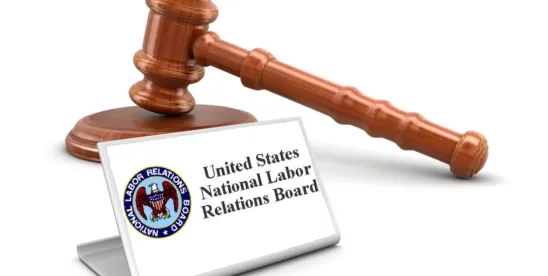On July 9, 2024, the United States Court of Appeals for the Fifth Circuit told the National Labor Relations Board’s to reconsider the standard for whether abusive or inappropriate speech is protected under Section 7 of the National Labor Relations Act. In so doing, the Fifth Circuit vacated the National Labor Relations Board’s decision in Lion Elastomers, LLC (Lion II), 372 NLRB No. 83 (2023), and reinstated the standard in General Motors, LLC (GM), 369 NLRB No. 127 (2020).
Lion I, GM, and Lion II Decisions
As we previously reported, in May 2023 the National Labor Relations Board (“NLRB” or the “Board”) overturned its 2020 ruling in GM, making it more difficult for employers to discipline employees for abusive or inappropriate workplace speech related to concerted or union activity (“PCA”). Previously, in Lion Elastomers, LLC (Lion I), 369 NLRB No. 88 (2020), the Board found the employer violated Section 8(a)(1) and (3) of the National Labor Relations Act (“NLRA” or the “Act”) by disciplining and discharging an employee for his conduct at a safety meeting and because he engaged in union activity. The employer filed a petition for review in the Fifth Circuit Court of Appeal.
While review was pending, the Board issued the GM decision. GM held that certain abusive or inappropriate workplace speech by employees engaged in PCA was not protected by Section 7 of the NLRA, reversing 40 years of prior precedent. The GM standard gave employers a bright line rule to determine what conduct is and is not protected under the Act, and clearly defined what the employer must prove if they discipline employees for engaging in abusive and PCA-related conduct. The GM standard harmonized the Act with other laws prohibiting harassment and bullying in the workplace, which allowed employers to comply with the Act and avoid risking liability for violation of other laws, such as those requiring employers to maintain harassment-free workplaces. Under GM, the Board applied the Wright Line burden shifting framework which first requires the General Counsel to show: (1) the employee engaged in Section 7 activity, (2) the employer knew of that activity, and (3) a causal relationship between the discipline and the Section 7 activity (i.e. employer animus). If the General Counsel made such a showing, the burden shifts to the employer to prove it would have taken the same adverse action absent the PCA. Thus, the GM standard gave employers the ability to discipline workers for engaging in abusive or inappropriate conduct provided the discipline was not in retaliation for PCA.
In 2020, the Fifth Circuit remanded Lion I back to the NLRB in light of the standard set forth in the GM decision. However, on remand, the Board issued Lion II in 2023, overruling GM and again requiring employers to tolerate abusive or offensive workplace speech in the context of PCA.
The Fifth Circuit Decision: Lion Elastomers, LLC v. NLRB
In Lion Elastomers, LLC v. NLRB, the Fifth Circuit said that the NLRB incorrectly used the remand proceeding to overrule the GM decision, and as a result, violated the employer’s due process rights. The three-judge panel reasoned that the remand order was not an invitation for the Board to reconsider what legal standard to apply, but rather, was an instruction to apply the legal standard set forth in GM. The panel found that the employer was not afforded an opportunity to be heard before the Board decided to overrule GM, in violation of due process. Accordingly, again, the Fifth Circuit vacated the Board’s decision and remanded the case with specific instructions to apply GM.
However, the Fifth Circuit did not address the merits of the NLRB’s ruling in Lion II and expressly declined to determine whether the Board’s 1979 decision in Atlantic Steel, which was the basis for Lion II, was a valid interpretation of the Act. The Fifth Circuit wrote: “Although we discuss how an agency has understood a question of statutory interpretation, we resolve this case on other grounds and need not reach the validity of the agency’s interpretation” despite the U.S. Supreme Court’s June 28, 2024 decision in Loper Bright Enterprises v. Raimondo, that overruled the long-standing Chevron deference standard.
Important Takeaways
The Fifth Circuit ruling means that the Board cannot enforce its decision in Lion II. Whether it will have a broader impact on the Board is unclear. The NLRB typically follows a doctrine of non-acquiescence and ignores appeals court rulings that break with its view of labor law, and so if the Fifth Circuit had overruled Lion II on the merits, the ruling’s impact outside of the Fifth Circuit would likely be minimal. However, because the Fifth Circuit vacated Lion II on procedural grounds, which is a scenario not covered by the Board’s non-acquiescence policy, the Board may find it difficult to persuade courts to enforce the Board’s rulings based on Lion II.
Given the ever-changing standard, employers should use caution in disciplining employees engaging in PCA by using abusive or offensive speech and be prepared to present sufficient evidence to justify the discipline.






 />i
/>i
